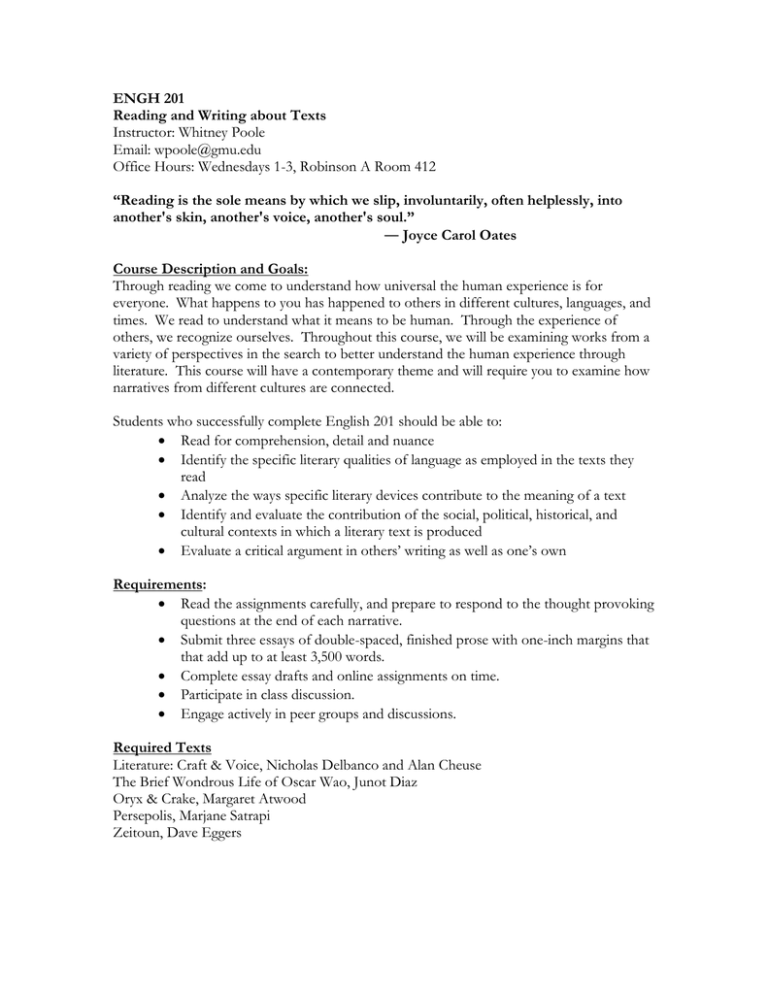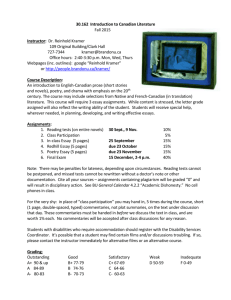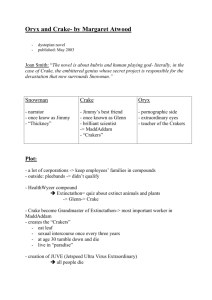ENGL 201 - s3.amazonaws.com
advertisement

ENGH 201 Reading and Writing about Texts Instructor: Whitney Poole Email: wpoole@gmu.edu Office Hours: Wednesdays 1-3, Robinson A Room 412 “Reading is the sole means by which we slip, involuntarily, often helplessly, into another's skin, another's voice, another's soul.” ― Joyce Carol Oates Course Description and Goals: Through reading we come to understand how universal the human experience is for everyone. What happens to you has happened to others in different cultures, languages, and times. We read to understand what it means to be human. Through the experience of others, we recognize ourselves. Throughout this course, we will be examining works from a variety of perspectives in the search to better understand the human experience through literature. This course will have a contemporary theme and will require you to examine how narratives from different cultures are connected. Students who successfully complete English 201 should be able to: Read for comprehension, detail and nuance Identify the specific literary qualities of language as employed in the texts they read Analyze the ways specific literary devices contribute to the meaning of a text Identify and evaluate the contribution of the social, political, historical, and cultural contexts in which a literary text is produced Evaluate a critical argument in others’ writing as well as one’s own Requirements: Read the assignments carefully, and prepare to respond to the thought provoking questions at the end of each narrative. Submit three essays of double-spaced, finished prose with one-inch margins that that add up to at least 3,500 words. Complete essay drafts and online assignments on time. Participate in class discussion. Engage actively in peer groups and discussions. Required Texts Literature: Craft & Voice, Nicholas Delbanco and Alan Cheuse The Brief Wondrous Life of Oscar Wao, Junot Diaz Oryx & Crake, Margaret Atwood Persepolis, Marjane Satrapi Zeitoun, Dave Eggers Grading Short Story Analytical Paper Novel Analytical Paper Nonfiction Analytical Paper Weekly Analysis 25% 25% 25% 25% Three Analytical Papers ~1200 words each. These papers should analyze themes, literary techniques, or the social context of a narrative. Weekly Analysis Select a unique passage and analyze what you find interesting about the selection. Analyses should be around 200 words and address literary techniques, character development, setting, point of view, themes, or social contexts. Submit both the passage and your analysis on Blackboard by Wednesday’s class each week. Week 1 M Introductions W Rapture, Anton Chekhov; The Lady with the Pet Dog, Anton Chekhov; Optimists, Richard Ford Week 2 M Greasy Lake, T. Coraghessan Boyle; Short Happy Life of Francis Macomber, Ernest Hemingway W The Rememberer, Aimee Bender; The Interpreter of Maladies, Jhumpa Lahiri; Move From Summary to Interpretation, H-28 Week 3 M No Class W What You Pawn I Will Redeem, Sherman Alexie; No One’s a Mystery, Elizabeth Tallent Week 4 M The Cathedral, Raymond Carver, Interactive Reading of Jamaica’s Kincaid’s Girl W The Metamorphosis, Kafka; Peer Review Week 5 M The Brief Wondrous Life of Oscar Wao, Junot Diaz Ch 1 p. 1-50 W Ch 2 p. 51-75, Short Story Analytical Paper due Week 6 M The Brief Wondrous Life of Oscar Wao, Junot Diaz Ch 3 p.77-165 W Ch 4 p. 167-201 Week 7 M The Brief Wondrous Life of Oscar Wao, Junot Diaz Ch 5 p. 203-261 W Ch 6-8 p. 263-335 Week 8 Spring Break Week 9 M Oryx & Crake, Margaret Atwood Ch 1-3 p. 1-48 W Ch 4-5 p. 49-112 Week 10 M Oryx & Crake, Margaret Atwood Ch. 6 p. 113-146 W Ch. 7-8 p. 147-220 Week 11 M Oryx & Crake, Margaret Atwood Ch. 9-10 p. 221-264 W Ch. 11-12 p. 265-331 Week 12 M Oryx & Crake, Margaret Atwood Ch. 13-15 p. 333-376, Peer Review W Persepolis, Marjane Satrapi p. 1-79 Week 13 M Persepolis, Marjane Satrapi p. 80-155 Novel Analytical Paper Due W Zeitoun, Dave Eggers p.1-81 Week 14 M Zeitoun, Dave Eggers p. 85-146 W p. 146-202 Week 15 M Zeitoun, Dave Eggers p. 205-268 W p. 269-337 F Nonfiction Analytical Paper Due Policies Completion Policy: You must complete all main essay assignments to earn a "D" or higher. English 201 Grading Policy: Students in ENGL201 receive a final grade of A+ (4.0), A (4.0), A- (3.67), B+ (3.33), B (3.0), B- (2.67), C+ (2.33), C (2.0), D (1.0), or F. Students must earn a grade of D or higher to complete the 201 requirement; students whose grades are lower than a D will not earn credit for the course. Course Grading Policy: In grading essays, I use the following general criteria: A “D” level grade (60-69%) denotes below average college-level writing and achievement. The essay has moments of competence in response to the assignment: it meets, to some degree, some of the assignment requirements, and demonstrates that the author has put time and effort into communicating his/her ideas to his/her targeted audience. It has a thesis, presents some support; sentence-level errors do not significantly prevent comprehension. Essays that do not meet these criteria will not earn a "D." A "C" level grade (70-79%) denotes average college-level writing and achievement. The essay is a competent response to the assignment: it meets, to some degree, all the assignment requirements, and demonstrates that the author has put significant time and effort into communicating his/her ideas to his/her targeted audience. It has a thesis, presents some support, and moves from point to point in an orderly fashion; sentence-level errors do not significantly prevent comprehension. A "B" level grade (80-89%) highlights a strong example of college writing and thinking. In addition to meeting the "C" level requirements, such an essay goes further in some way(s): it demonstrates some insight into the "gray areas" of the topic, provides original or very thorough support that is tightly woven into the overall argument, reads smoothly at both the sentence and paragraph levels, and/or exhibits a personal "voice" or style. It has few sentence-level errors. An "A" level grade (90-100%) marks an essay that is a delight for the reader. Even more than in a "B" essay, its author anticipates and responds to possible reader questions, uses a wide range of supporting evidence, engages the reader in a provocative conversation, provides unexpected insights, and/or uses language with care and facility. "F" level essays do not meet the basic expectations of the assignment. Submitting Class Work Assignments are due at the beginning of class on the due date. Unless otherwise noted, all formal assignments should be typed using a standard font and size (Times New Roman 12 or 14 point is commonly acceptable), and double-spaced. Put your name and the instructor's name at the top of the first page. Late Work Policy Late assignments are those arriving any time after the beginning of class on the due date. If you need to, you can email me an assignment to avoid a grade penalty, but you must still turn in a hard copy as soon as possible. You may place an assignment in my mailbox in Robinson A487; do not ask the office staff to validate that you have turned it in; do not put work on or under my office door or on my desk if I am not there. Late assignments will lose half a letter grade for each calendar day that they are late. Latework penalties cannot be changed through revision. Class Participation You should be actively present. This implies brain awareness as well as the basic courtesies of formal social gatherings. Students who are sleeping, reading the newspaper, carrying on private conversations, answering or texting on cell phones, or working on assignments for other classes (etc.) are not wholly, actively present and thus may lose class participation points for that day. If you are seriously unprepared for class or group work—having absolutely no draft for a draft workshop, for example—you may lose class participation points for that day. Any serious breach of good classroom conduct may cause you to lose all participation points. Revision Policy The analytical essays may be revised for a new grade if they earn lower than a B+. Revisions must demonstrate substantial change to the focus, support, approach, and/or organization of the essay in addition to comprehensive error correction, or they will be returned with no grade change. Revisions must be completed within two weeks of the essay's return to you. English Department Statement on Plagiarism Plagiarism means using the exact words, opinions, or factual information from another source without giving that source credit. Writers give credit through the use of accepted documentation styles, such as parenthetical citation, footnotes, or end notes; a simple listing of books, articles, and websites is not sufficient. Plagiarism is the equivalent of intellectual robbery and cannot be tolerated in an academic setting. Student writers are often confused as to what should be cited. Some think that only direct quotations need to be credited. While direct quotations do need citations, so do paraphrases and summaries of opinions or factual information formerly unknown to the writers or which the writers did not discover themselves. Exceptions to this include factual information which can be obtained from a variety of sources, the writers' own insights or findings from their own field research—what has been called common knowledge. What constitutes common knowledge can sometimes be precarious; what is common knowledge for one audience may be so for another. In such situations, it is helpful to keep the reader in mind and to think of citations as being "reader friendly." In other words, writers provide a citation for any piece of information that they think their readers might want to investigate further. Not only is this attitude considerate of readers, it will almost certainly ensure that writers will not be guilty of plagiarism. Consult the George Mason Honor Code for more information. Students with disabilities: Students with documented disabilities are legally entitled to certain accommodations in the classroom. If you are a student with a disability and you need academic accommodations, please see me and contact the Disability Resource Center (DRC) at 993-2474. All academic accommodations must be arranged through the DRC. The University Writing Center: Since you will be writing several papers in this course, you may want to visit the University Writing Center (http://writingcenter.gmu.edu), located in Robinson A114, for assistance. The Writing Center is one of the best resources you will find on campus. They have an outstanding website that offers a wealth of online resources for student writers. You can schedule a 45-minute appointment with a trained tutor to help with any phase of the writing process. You can even obtain assistance with papers by visiting the online writing center at http://writingcenter.gmu.edu/owl/index.html, but please plan ahead and allow yourself at least 2-3 days to receive a response. Make an appointment on their website, or by calling 703-993-1200, or stop by and schedule a session.





